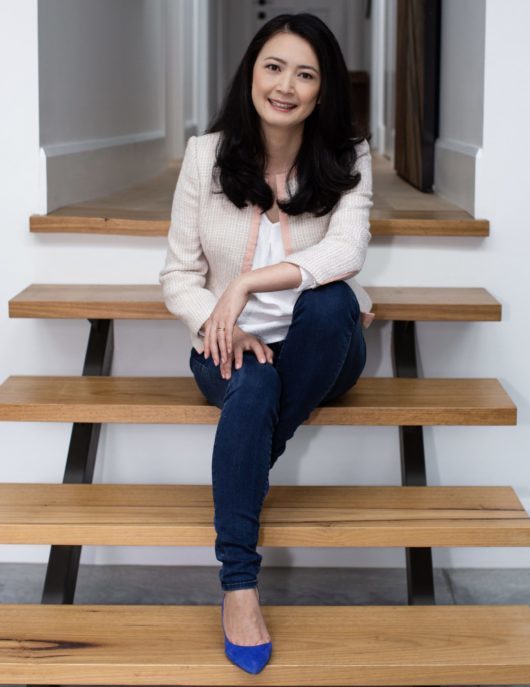
For Salt’s latest Women in Tech interview, we caught up with
Sylvia Ding, former Country Manager of Amazon Alexa, Australia and New Zealand, to talk diversity and advice on creating an inclusive workplace.
The #SaltSessions Women in Tech #WiT interview series speaks with thought leaders from around the world to get their opinion and advice on how they have grown their career in tech, and overcome challenges and adversity during their career.
What is your current role and the most exciting part of your work?
In my recent role as the Country Manager of Amazon Alexa, Australia and New Zealand, I was responsible for building, launching, and managing the Alexa and Echo product range, business and team in Australasia. The most exciting part of my work was building a product that was tailored for and loved by our customers in Australia and New Zealand. Our team made sure that the Australasian Alexa understood and spoke Aussie and Kiwi, knew the difference between thongs and jandals, answers to who invented the pavlova, spell Woolloomooloo, and tell you the longest place name in the world is Taumatawhakatangihangakoau
auotamateaturipukakapikimaungahoronukupokaiwhenuakitanatahu in New Zealand.
We loved inventing on behalf of our customers and building new features that ANZ customers uniquely cared about like UV index and surf reports. Our Alexa Skills team worked with hundreds of ANZ companies and thousands of developers to build tens of thousands of Skills using voice technology. So, customers can ask Alexa to check in with Qantas and Air New Zealand, manage their account with Westpac and AGL, stay updated with news from ABC and 1News, and even check local bin collection days. Reading reviews from our customers thanking Alexa for helping their child with a speech impediment to speak more clearly, for making it much easier for their vision-impaired father to listen to their favourite songs and radio stations, for helping families stay connected with drop-ins and video calling during COVID-19 lockdown, is absolutely the most rewarding part of the job.
What has been your most career defining moment that you are proud of?
So many happy moments come to mind, and although this goes way back, I would never forget the excitement I felt the first time I launched a global product — the Vodafone Google Mobile Search app and portal. Taking an idea all the way from concept to seeing it live and used by customers all over the world was exhilarating. From writing the requirements, running the vendor selection and trial programmes in the UK and Spain, negotiating with the big search giants — Google, Yahoo, Microsoft, and then finally working with various teams on the design, development, and launch, took months of hard work and dedication by many people. Seeing the great uptake by millions of customers and also increase in revenues for both the company and our partner gave everyone involved a great sense of achievement and pride. This was the experience that made me love building products.
What do you think we should be doing more of to encourage more girls to consider a career in tech?
Start earlier and showcase more role models! I was inspired to study Engineering by Jeni Mundy, then CTO of Vodafone New Zealand, who came to my high school and did a speech on Women in Engineering. The ratio of female to male students studying engineering at the University of Auckland has increased from about 20% during my time there to about 27% now. To truly achieve gender balance in Tech, we need to change the perception that it’s a male-dominated industry and showcase that both men and women can succeed in Tech. Teachers and educators are also important in supporting this initiative. I’m already reading STEM and Women in Science children’s books to my daughter, and she’s not even two yet! They are super fun though and the whole family enjoys reading them!
What challenges have you faced in the workplace, especially your experience in male-dominated environments?
I went from a girls only high school to studying engineering where 80% of the class were boys, so that was a bit of a shock, but it was a good training ground for when I entered the Tech industry. Throughout my career, I was often the youngest, and only Asian and/or female in the room, and had to lead different teams, often in different countries, to make decisions and deliver results, so I had a lot of practice, which helped to build my confidence. My experience was that as long as you added value by offering a unique perspective and have strong judgement and good instincts, no one would challenge you based on gender. I also actively sought out diverse perspectives to avoid unconscious biases in discussions and decision-making processes.
What is the biggest deterrent in your opinion to women succeeding in the workplace?
First of all, I have to say that my one year “off” as a full-time mum during maternity leave was the hardest job I’ve ever had, by far. So, I have huge respect and admiration for women who prioritise their families and choose to be the primary carer of their children. For those of us who have gone back to the workplace, the biggest deterrent I’ve seen is people succumbing to the social norm and expectation that women should take on more share of the household and childcare responsibilities.
Due to imbalances in support for female vs. male employees, like longer maternity vs. paternity leave, and flexibility at workplaces given to new mums vs. new dads, many families just find it easier and financially sensible for women to pause their career progression while their children are young, by taking a career break or working part-time. This is fine and does not impact success in the long run, and many successful female executives I know have done this. However, it would be nice if one day, and I hope soon, women and men will receive equal parental leave benefits and support, and men who choose to be primary carers of the family will be the norm rather than a novelty.
Who has been your biggest advocate/mentor in your career and why?
I have always believed that you can learn something from everyone, and have been fortunate to have had many mentors and advocates. Earlier in my career, I was often very surprised when my managers gave me more responsibilities and leadership roles than what I thought I qualified for. The combination of the “gender confidence gap”, Australasian “tall poppy syndrome”, and the humble nature of a first-generation immigrant, had affected my subconscious behaviour. The person who helped me change that was my CEO at Amazon China, Doug Gurr, who hired me as the youngest TA (Technical Advisor/Chief of Staff) for an Amazon Country CEO. He said, “Nobody likes someone who has more confidence than capability, but it’s also not good to have less confidence than capability. Having a good balance will help you be more effective.” And I’ve been striving to strike the right balance since.
You can definitely be confident and effective, and humble and empathetic at the same time.
As an employer, what would you recommend to other companies regarding infrastructure to have in place to develop the best talent?
Put in mechanisms, like personal development plans and reviews, that put the ownership of development on both the employee and the manager. Set SMART, short- and long-term goals that are tailored for the individual and support learning on both professional and personal front. Mentoring programs and informal networking sessions are also great ways to expand people’s views and cross-pollinate ideas.
In a management position, how have you found it best to promote and nurture women’s careers?
We found that teams with female leaders also attracted and retained more female leaders. And so, for our hiring and promotion loops, especially for senior and tech roles, we always made sure there was good diversity on our panels. We also ensured all managers receive training on diversity and inclusion, and everyone reviewed unconscious bias training before talent reviews.
What are some of the best and worst workplace initiatives you have seen/heard of to help promote diversity?
I really liked the Women@Amazon affinity group. We hosted Fireside Chats with internal and external senior leaders and shared practical career progression tips, held informal networking sessions, and organised fun activities like yoga. One controversial activity we organised in Amazon China was on International Women’s Day (IWD) where every female employee received a small gift of appreciation. This was standard practice for most Chinese companies, although it’s not the norm for western companies.
One year during IWD celebrations, we had senior leaders and managers give every female employee a flower, which was received with much enthusiasm! Interestingly, some of the “western expats” managers didn’t feel it was appropriate and felt that male employees were left to feel excluded. Whereas the Chinese managers and teams loved the experience, male colleagues happily wished their female peers Happy Women’s Day, and everyone took lots of photos together and posted on social media. It’s important to note that there are also cultural differences in how we promote diversity in the workplace.
How has COVID-19 affected the way you work?
There were a few weeks when my husband and I both worked remotely, and it was a huge challenge trying to maintain effectiveness while also taking care of a toddler full-time. We found ways to make it work by sharing calendars to avoid overlapping meetings and adjusted our working hours, but it was definitely not business as usual. It was comforting that every layer of leadership all the way from Jeff Bezos sent notes to the teams about the importance of prioritising family and personal health during these difficult times. I also made sure to check in on my team members, especially those with young children, to provide reassurance and help alleviate some of the stress. It is during tough times that people need the most support and the time for leaders to demonstrate empathy and compassion.
My husband and I have been thinking about returning to New Zealand for a while, and COVID-19 has accelerated these plans. We were very sad to leave our amazing teams at Amazon, but we were super lucky to have made it back into the country just before the borders shut. And we’re so grateful to be back here with our family and friends.
What changes do you foresee in the workplace in the next 12 months?
It’s been interesting for me to learn about the rise of new companies that are fully remote working, there are no offices and hundreds of staff are spread all around the world. They have great mechanisms in place to foster inclusion and replicate the ability to make personal connections as you would in physical workplaces. More companies will trend towards some form of remote working even as lockdown ends, as both staff and companies want to leverage the advantages of flexible working, and reduction in commuting times and facilities costs. Large tech companies like Google, Microsoft, Facebook, and Twitter have already announced plans to extend work from home arrangements going forward.
Businesses will need to accelerate digitisation and move fast to meet their customers online. A majority (93%) of consumers plan to shop online either more (60%) or at the same level (33%) as they did before the outbreak, according to “The Early Effects of COVID-19 On Online Shopping,” a new study of nearly 1,200 U.S. consumers from RSR Research and Yottaa. One of the reasons why China has leapfrogged ahead of the United States of America in e-commerce is because they were forced to do so in the early 2000s due to SARS. Companies should use the insights gained during these challenging times and become leaner, more efficient, and resilient. I think we can all learn from Darwin’s Origin of Species, “It is not the most intellectual of the species that survives; it is not the strongest that survives; but the species that survives is the one that is able best to adapt and adjust to the changing environment in which it finds itself.”
Who is your modern-day hero?
I’m inspired by Melinda Gates and her devotion to women’s and girls’ rights. I loved the way she made the world think about how empowering women will change the world using real-life examples and data. She is the most powerful woman in philanthropy as co-chair of the Bill and Melinda Gates Foundation, the world’s largest private charitable foundation with a $40 billion trust endowment. And yet, she is still authentic and genuine, while solving some of the toughest global challenges from education and poverty to contraception and sanitation.
Any reading/website you would recommend to stay updated?
I follow The Economist, Harvard Business Review, and McKinsey & Company to stay on top of current business news, and many tech companies and industry experts like Mary Meeker to keep up with the Tech industry. In addition to local ANZ news, I also read news from the UK and China regularly to make sure I’m getting an international perspective. I’m quite curious about new and future trends, and have been enjoying reading Chinese web novels and the occasional TikTok to see “what the kids are into nowadays”.
What is your biggest stress reliever?
Spending time with my little miss almost two years old always helps to put things into perspective, and makes me grateful for some of the most wonderful things in life that we as adults sometimes take for granted…like how fun are bubbles?!
Is there one piece of advice you wish somebody gave you at the beginning of your career?
It’s okay not to know what you want to do next because your next job might not exist yet! Know what you want to achieve and gain experience in it, and grab onto the opportunity when it presents itself.
What job did you dream of when you were a kid — your Plan A career path?
I never knew what I wanted to be when I grew up. Product Manager wasn’t a job type in my high school career survey. E-commerce was still an experiment when I was at university. I didn’t know what a Chief of Staff was until I became the first one for Amazon China. Alexa didn’t exist until only a few years ago and was still a top secret project until we launched. I’m often asked how I planned my career and the answer is I didn’t really. What’s important to me is that I’m doing something I’m interested in and learning a lot from. I always did every job to the best of my abilities and loved gaining new skills and experiences. And that’s what’s helped me shape a very interesting career path so far.
Fun fact about you?
I love travelling, learning about new cultures and trying locale cuisines. So far, I have travelled to more than 50 countries, and have ticked the top three flower festivals in the world off my bucket list: Sakura in Japan, tulips in the Netherlands, and lavender in Provence, France. I’m now onto the Seven Wonders of the World with four down, three to go! I can’t wait until we win against the pandemic and can travel again! In the meantime, I’ll happily showcase the natural beauty of New Zealand to my Canadian husband.
About Sylvia
Sylvia has enjoyed a diverse international career in Tech spanning telco, e-commerce, digital, and smart (AI/ML) technology industries in New Zealand, United Kingdom, China, the United States of America, and Australia. She is a strong advocate for diversity and inclusion in Tech, and a long-serving mentor for young leaders in the Tech industry. Sylvia is passionate about how technology can have a positive impact on our lives and our future.
In her most recent role as the Country Manager of Amazon Alexa, Australia and New Zealand (ANZ), Sylvia was responsible for the Amazon Alexa and Echo Devices business and teams in ANZ. She and her team built, launched, and managed the Australasia version of Alexa, Amazon’s virtual AI assistant and Amazon’s Echo smart speaker devices. She was also a part of the leadership team that launched Amazon in Australia in 2017. Prior to Australia, Sylvia was the Chief of Staff to the CEO of Amazon China and helped to drive Amazon China’s business transformation from a local retail business to a global cross-border e-commerce business. In the UK, Sylvia managed and turned around Amazon UK’s Mobile e-commerce business. During her time at Vodafone, Sylvia held various Product and Strategic Partnership management roles in the UK and New Zealand, including managing the Vodafone Group and Google Global partnership and launching the joint mobile search product across the Vodafone Global footprint in 30+ countries.
Sylvia is originally from Shanghai and grew up in Auckland. She graduated with Honours in Mechatronics Engineering from the University of Auckland and also holds an MBA degree from the London Business School.
Outside of work, Sylvia loves travelling and is a keen foodie. She has recently moved back to New Zealand with her young family after 12.5 years abroad and is currently enjoying making up for lost time with family and friends. She also volunteers as a judge for the Technovation Girls Challenge and is a mentor at TechWomen NZ.
Looking for some more inspirational reads?
Check out more from our Women in Tech interview series and Females in FinTech interviews .
To shape your future with Salt, a leading digital recruitment agency, send your CV to enquiry@welovesalt.com or use our search to find Technology jobs. You can also keep in the loop by following us on LinkedIn, Facebook, Instagram and Twitter.


